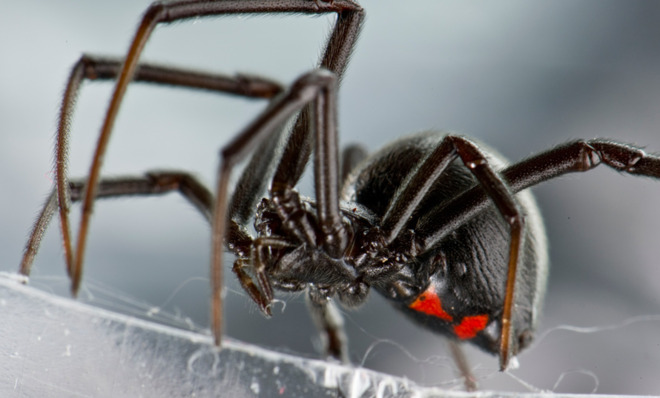The secret strategy behind the black widow's bite
The deadly spider is very judicious with its venom

Venoms generally aren't cheap for animals to produce, in terms of energy. The poisons are often made up of hundreds, even thousands, of components that have to be replenished once a store of venom is used up. Scientists working with venomous snakes have found that replacing depleted venom can increase their daily energy needs from anywhere between 11 percent and 69 percent for several days.
When a weapon comes at a high cost, it makes sense to use it judiciously. "Dry" bites and stings have been reported in various snakes, spiders, and insects, suggesting that they have a choice of whether or not to use venom at all. They also seem to be able to control just how much venom to deploy when they use it. Snakes and spiders have been known to "meter" their venom while hunting, using varying amounts depending on the type of prey and how much it struggles.
To explore how and when arachnids use their deadly assets when defending themselves (as opposed to when they're hunting), David Nelsen, Wayne Kelln, and their adviser William Hayes at Linda Loma University in California collected more than 50 black widows and poked, prodded, and squeezed them to see how they would respond. Naturally, they were hesitant to do this with just their hands, so they built gelatin "fingers" for their mock attacks.
The Week
Escape your echo chamber. Get the facts behind the news, plus analysis from multiple perspectives.

Sign up for The Week's Free Newsletters
From our morning news briefing to a weekly Good News Newsletter, get the best of The Week delivered directly to your inbox.
From our morning news briefing to a weekly Good News Newsletter, get the best of The Week delivered directly to your inbox.
The first experiment was designed to see how black widows respond to different threats. To simulate a low-threat attack, the researchers gave the spiders a single poke while they were still in their webs. A medium-level threat consisted of 60 pokes over the course of a minute. Finally, for a high-threat situation, they coaxed the spiders onto a gelatin finger, where the spider was gently squeezed.
The spiders did react differently to the three threats. At the lowest level, they were mostly non-confrontational. Of those that reacted at all, the majority simply moved away from the finger. Only a few spiders defended themselves from the fake finger by flicking their silk at it.
When they were prodded repeatedly, all of the spiders retreated from the finger. Some also played dead, while more than half of them also flicked silk. One spider attempted to bite the finger. In the most dangerous situation, when they were picked up and given a pinch, most of the spiders fought back in some way and almost two-thirds bit the finger.
Next, the researchers tested to see if black widows can control how much venom they deliver in a bite. The spiders were presented with three targets in succession — vials that would collect their venom when bitten — while the researchers either pinched their legs or squeezed their abdomens.
A free daily email with the biggest news stories of the day – and the best features from TheWeek.com
The results: Some of the spiders' bites were dry and no venom was detected. When venom was used, the results varied widely depending on the circumstances of the attacks.
The spiders delivered more bites per attack when their legs were pinched, but delivered more venom when it was their bodies feeling the squeeze; they also increased the amount of venom with each bite. This makes sense, the researchers say, because the body pinch presents the greater threat to the spider. They can lose a leg and survive, but trauma to the body is often lethal.
To Nelsen and his team, it's pretty clear that black widows can control how much venom they use, and really let loose when the straits are dire. In the first experiment, the spiders mostly bit only as a measure of last resort. In the second test, the spiders alternated between wet and dry bites. "Some spiders delivered venom to all targets," the researchers write. "Whereas others never used their venom, suggesting individual proclivities towards dry bites."
A few of the spiders used a mix of wet and dry bites, with the dry coming first. That suggests the venom was available but withheld, and not just the result of venom running out. With the wet bites, the spiders used anywhere from a quarter to almost 90 percent of their available venom in a single bite. And the more severe threat of a full-body squeeze was met with more venom overall and more per bite.
How exactly those decisions are made is a question for another study. "Cognitive control, including higher-order cognitive processing may be involved," the researchers say. But there could also be a simpler explanation — like reflexive responses to certain types of attacks.
For now, there's a very practical takeaway: Black widows probably won't bite you, even if you're really getting in their faces and bothering them. Just don't squish them or otherwise put them in a life-or-death situation. And even if the spider does bite, it's not necessarily going to inject any venom.
-
 The Week Unwrapped: Why is China clearing out its generals?
The Week Unwrapped: Why is China clearing out its generals?Podcast Plus, can the Conservatives win back the centre? And what’s gone wrong with Britain’s hearing aids?
-
 The week’s best photos
The week’s best photosIn Pictures A Viking festival, an inky fingerprint, and more
-
 6 homes with incredible balconies
6 homes with incredible balconiesFeature Featuring a graceful terrace above the trees in Utah and a posh wraparound in New York City